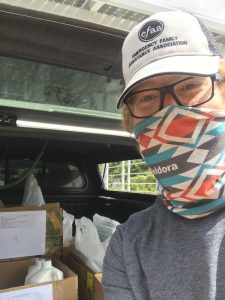 For several years, Scott volunteered with EFAA by driving our food truck to grocery stores across Boulder to pick up produce, dairy, meats, and prepared food and deliver these essential items to our food bank. But early in the pandemic grocery shelves were bare and most stores had limited food items to donate, reducing the need for Scott’s regular volunteer role.
For several years, Scott volunteered with EFAA by driving our food truck to grocery stores across Boulder to pick up produce, dairy, meats, and prepared food and deliver these essential items to our food bank. But early in the pandemic grocery shelves were bare and most stores had limited food items to donate, reducing the need for Scott’s regular volunteer role.
It wasn’t long before EFAA found a new opportunity to put Scott’s truck driving skills back to work. The food bank team noticed that not everyone who visited the food bank before the pandemic was coming in to pick up grab-and-go food bags. “Either they were sick themselves, immunocompromised, didn’t have a car …there was a whole host of reasons,” said Scott. It was on that phone call that Scott signed up to pilot a new COVID-19 response program: EFAA’s food delivery service.
To date, volunteers like Scott have done more than 300 deliveries to our neighbors facing food insecurity. People with disabilities and seniors living on fixed incomes often struggle to access healthy, nutritious foods — and the added health risk of visiting a grocery store or food bank makes it even more difficult.
The pandemic has opened the door for EFAA to experiment with more accessible program models. Remote appointments, electronic paperwork, and food delivery are just a few of the ways our services have changed for the better. In addition to providing food delivery, EFAA has improved food access by adding weekend hours one Saturday every month and implementing a new menu model that allows food bank visitors to choose their food. While challenging, this year has required us to rethink our service delivery. Many changes that were made because of the pandemic have made our programs stronger and we plan to take these lessons with us into the future. Thank you for being on this journey with us.


